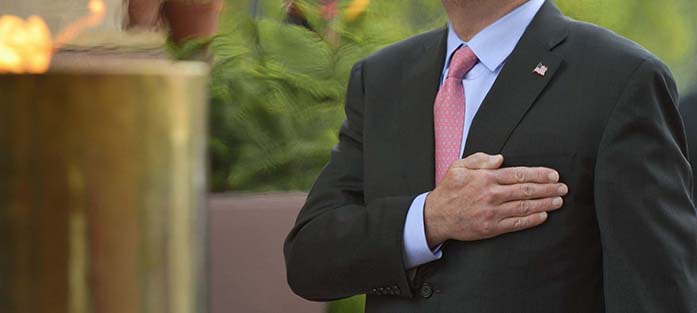Marcus Brown
The issue of standing or not standing during the national anthem has become a controversial issue for numerous professional sport organizations, and it appears to stem from an idea of presumed patriotism or lack thereof. A clear divide has emerged following the decision made by Colin Kaepernick, quarterback of the San Francisco 49ers, to remain seated during the anthem as a means of protesting the systematic discrimination levied at African-Americans and people of color in the United States. Megan Rapinoe, a professional soccer player for the Seattle Reign, followed suit by taking a knee during the national anthem Sept. 4, sparking similar criticism to that received by Kaepernick.
On the anniversary of 9/11, the decision not to stand for the national anthem carries even more weight and truly puts dedication to that form of protest to the test. While it is crucial to the nature of protest to displease one party or another, refusal to stand during the national anthem can be interpreted as an affront to the nation as a whole. Such was the case on Sunday, when four football players from the Miami Dolphins stood for a 9/11 tribute before kneeling during the national anthem. In the women’s soccer game between the Washington Spirit and the Seattle Reign Sept. 7, both teams were deliberately kept off of the field during the national anthem as to avoid the possibility of a repeat protest by Rapinoe. Bill Lynch, the owner of the Washington Spirit, explained the rationale for this action in a statement citing a desire not to “subject our fans and friends to the disrespect we feel such an act would represent.”
Granted that the right to protest is guaranteed by virtue of the Constitution, it is not difficult to see how Lynch’s pre-emptive actions crosses obvious moral grounds, but it does illustrate a valid point to consider when discussing the continuation of similar protests by professional athletes. Professional athletes have symbolic importance separate from what is expected them from on the field. Not only are athletes entertainers, they also serve as cultural ambassadors for the nation as a whole and for this reason a certain level of patriotism is expected from them. It is in this expectation that a very specific problem arises for those who do not receive the same benefits from their patriotism as their white, cisgender, or heterosexual counterparts.
The position of a minority professional athlete is inherently precarious because of the dual expectation to unquestionably abide by the social regulations imposed by a larger institution. This organisation propagates the suffering of those that occupying the same societal position as the athlete but without the benefits afforded to professional athletes in this country. The minority athlete is at odds, and ultimately at the mercy of, a mercurial, ambivalent society that can reward or punish based solely on an unchangeable aspect of a person’s existence such as skin color or sexual orientation at any given moment.
The criticism of protest always in some way stems from the discomfort felt by the party being protested, and as a result there is always a reason a protest is deemed ill-timed or outright inappropriate. However, in order for a protest to wield any form of meaningful clout, it must be inopportune. A protest that appeases the oppressor is not a protest. At the end of the day, it is not up to those being protested to determine when, where, and how the oppressed voice their grievances. Assuming that one has the right to mandate how another protests is often symptomatic of what is being protested in the first place.



